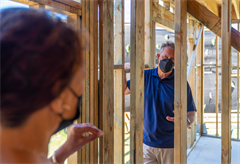President Trump's January 2025 "Unleashing American Energy" Executive Order states that the “disbursement of funds provided through the Inflation Reduction Act and Infrastructure Investment and Jobs Act will be immediately paused until further notice." This webpage will be updated once more information is provided by the Trump administration and Congress has decided how to respond to the executive order.
Maximizing Bipartisan Infrastructure Law Federal Funding for Hawai'i
Two landmark pieces of legislation, both of which I strongly supported, were enacted in the 117th Congress (2021-2023). The Inflation Reduction Act (IRA) is the largest climate/energy-related investment in our history. You can learn more about that bill here. The other bill, the Bipartisan Infrastructure Law (also known as the BIL or Infrastructure Investment and Jobs Act) is the largest reinvestment in our country’s infrastructure in generations. This webpage is dedicated to explaining this law in detail and providing resources on its programs.
This game-changing law and its many initiatives will ultimately only be fully effective if fully implemented all the way down to our local communities. For my part, this means assuring that I track each of the hundreds of federal programs through which the funding will be distributed and assure that my government and community partners throughout Hawai‘i are fully aware of these opportunities and fully seek and obtain the funding.
We have already begun doing all of this on the BIL with our state and county government partners, through which the vast majority of the funding will be obtained and distributed. To date, $994 million in BIL funding has been announced and is headed to Hawai‘i. You can read more about the BIL funding headed to Hawai‘i here, and you can review a resource guide prepared by the staff of the Transportation and Infrastructure Committee here.
This downloadable spreadsheet includes a list of the BIL federal funding available to state and county governments and non-profit organizations to implement these initiatives. It details who is eligible and in as much detail as currently available, information on how to apply. My office will update this spreadsheet as I identify new funding opportunities available to our Hawai‘i.
The BIL generally falls into the following major categories: transportation; climate, energy and the environment; drinking water; and broadband. Each of these major categories is explained below in greater detail.
If you need assistance in understanding and applying for funding from these programs or a letter of support for your application, please contact my Honolulu office at (808) 650-6688 or email me at ed.case@mail.house.gov.
Transportation
The BIL is a historic opportunity to repair the one-in-five miles of our roadways and more than 45,000 bridges in the United States rated as “in poor condition.” The law also contains funding to rebuild and reinvest in our railways, public transit infrastructure and the safety of our transportation system. It further reauthorizes federal surface transportation programs for five years and invests billions in
transformational projects that will create good-paying jobs, grow the economy and make our transportation system safer and more resilient.

Here are a few examples of how the BIL will impact Hawai‘i:
1. Based on formula funding alone, Hawai‘i will receive about $316 million over five years to improve public transportation options across the state
2. Airports in the state will receive approximately $246 million for infrastructure development for airports over five years.
3. Hawai‘i can expect to receive approximately $9.2 million over five years in funding to augment commercial motor vehicle safety efforts to reduce crashes.
4. Over five years, Hawai‘i will receive approximately $15 million in 402 formula funding for highway safety traffic programs, which help states to improve driver behavior and reduce deaths and injuries from motor vehicle-related crashes.
Climate, Energy and the Environment
Each year, millions of Americans feel the effects of climate change when their roads wash out, power goes down or homes get flooded. The BIL is a historic investment in the resiliency of our infrastructure to climate change and natural hazards. These investments help build an economy powered by clean energy and resilient to climate change, while creating good paying jobs and rebuilding our domestic manufacturing base.
Broadband
Quality internet service is necessary for Americans to do their jobs, to participate equally in school learning, business opportunities and health care and to simply stay connected. Yet, by one definition, more than 30 million Americans live in areas where there is no broadband infrastructure that provides minimally acceptable speeds – a particular problem in rural communities throughout Hawai‘i.
In Hawaii's 1st Congressional District, the savings available through the American Rescue Plan and BIL have had a significant impact. As one example, as of January 2024, the Affordable Connectivity Program (ACP) has provided benefits to 26,000 households, reducing broadband costs in the district by roughly $11.8 million annually. Approximately 40.5% of households in the 1st Congressional District live in an area where an internet service provider is offering a no-cost plan to ACP participants. You can read more about the broadband funding headed to Hawai‘i here.
Drinking Water
Currently up to 10 million American households lack safe drinking water, and in too many communities, crumbling and inadequate wastewater infrastructure is a safety threat. The BIL makes a historic investment in drinking water and wastewater infrastructure to ensure we can deliver clean drinking water to all American families and help to eliminate the nation’s lead service lines.

